牛津译林版英语必修二Unit2Task1教案
- 格式:doc
- 大小:89.55 KB
- 文档页数:3
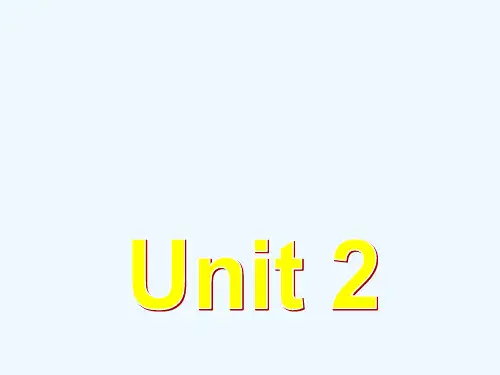
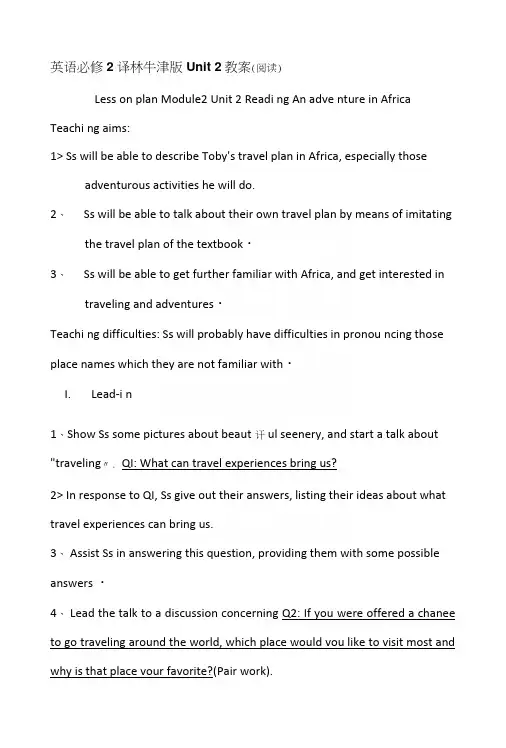
英语必修2译林牛津版Unit 2教案(阅读)Less on plan Module2 Unit 2 Readi ng An adve nture in Africa Teachi ng aims:1> Ss will be able to describe Toby's travel plan in Africa, especially thoseadventurous activities he will do.2、Ss will be able to talk about their own travel plan by means of imitatingthe travel plan of the textbook・3、Ss will be able to get further familiar with Africa, and get interested intraveling and adventures・Teachi ng difficulties: Ss will probably have difficulties in pronou ncing those place names which they are not familiar with・I.Lead-i n1、Show Ss some pictures about beaut讦ul seenery, and start a talk about "traveling〃. QI: What can travel experiences bring us?2> In response to QI, Ss give out their answers, listing their ideas about what travel experiences can bring us.3、Assist Ss in answering this question, providing them with some possible answers ・4、Lead the talk to a discussion concerning Q2: If you were offered a chanee to go traveling around the world, which place would vou like to visit most and why is that place vour favorite?(Pair work).5、Eliciting students from traveling in Africa, giving Ss a general impression about Africa・II.Presentati on1> Ask Ss to skim the passage and have a gen era I idea about the wholepassage:QI: What's the main idea of the article?It is an in formal letter about Toby's _______________ with his brother inQ2: Suppose we were going to travel with Tobv and Colin, can you find out Tobv's travel route?2、Help Ss an a lyze the passage for detailed readi ng, talki ng about Toby's travel plan, including his travel route, the adventurous activities he will do in each place, and the things he will take as well.1)> Ask Ss to read the first paragraph together.Q: What information can vou learn from this paragraph?厂Who:When:I How long:Where:What to do:^How to go:2)、Ss listen to the second paragraph and do a blank-filling exercise・ The first character of each word has been given.Toby and Colin leave London for Morocco. They are going to travel onc ____ through the Sahara Desert, which is very hot, dry and dusty. Andthey will be c ______ i n tents, s ____ in their big and thick sleeping bags. They will s beaut讦ul stars on clear nights・ They'll also bring a t _________ with them so that they can see in the dark・ And they think it is u to sit on a camel, because they will travel on camels for sixdays.3)、Ss find out the adventurous activities Toby will try and the things they will take.QI: what adventurous activities will Toby and Colin try in the Saraha Desert? Q2: What other activities will they do?Q3: Since they will do such kind of activities” what should be taken with them? (show Ss some pictures about the things they take)4)、Ask one student to read paragraph 3. And Ss do some true or false Qs. QI: They can go white・water rafting, because the water is very rough・ Q2: white・water rafting is quite dangerous, so they decide to give it up.Q3: Tobv and Colin care about their safetv very much・Q4: How can they keep their life safe when rafting? Which special clothing should thev wear? (give Ss some pictures to choose)5)、Ss read paragraph 4-5 by themselves and try to find answers to the following Qs.QI: What activities are they going to do in Kenya?Q2: In order to take some really good pictures” they should get as close as possible to the animals, which is very dangerous・ But do we need to worry about them?6)、Girls read paragraph 6 together and do a multiple choice・QI: what's the last thing Toby and Colin will do in Africa? (Give them pictures to choose)A.go to beachB.climb mountainC.go to the HimalayasD.see sun setQ2: what/s the common problem to manv people when climbing mountains?7)、Ss summarize Toby's whole travel plan.III.Discussio nStudents work in group of four to describe their own travel plan after they graduate from our school. Give them some tips and some materials to talk about with each other.IV.HomeworkSuppose you were Toby, please write a postcard to Aihua, introducing one of the places they have visited in Africa.教师看高考阅读理解、专题训练(粋)、议论文的阅读(2)阅读下列材料,按要求完成读写任务Like many of my generation, I have a weakness for hero worship.At some point,however, we all begin to question our heroes and our need for them.This leads us to ask: What is a hero?Despite immense differences in cultures, heroes around the world generally share a number of characteristics that instruct and inspire people.A hero does something worth talking about.A hero has a story of adventure to tell and a community who will listen.But a hero goes beyond mere fame.Heroes serve powers or principles larger than themselves.Like high-voltage(电压)transformers, heroes take the energy of higher powers and step 让down so that it can be used by ordinary people.The hero lives a life worthy of imitation.Those who imitate a genuine hero experience life with new depth, enthusiasm, and meaning.A sure test for would-be heroes is what or whom do they serve? What are they willing to live and die for? If the answer or evidence suggests they serve only their own fame, they may be famous persons but not heroes.Madonna and Michael Jackson are famous, but who would claim that their fans find life more abundant?Heroes are catalysts (催化齐!j)for change.They have a vision from the mountain top.They have the skill and the charm to move the masses.They create new possibilities.Without Gandhi, India might still be part of the British Empire.Without Rosa Parks and Martin Luther King, J匚,we might still have segregated(隔离的)buses, restaurants, and parks-It may be possible for large-scale change to occur without leaders with magnetic personalities, but the pace of change would be slow, the vision uncertain, and the committee meetings endless.I •根据短文,写一篇30词左右的摘要II •根据所读短文,选择最佳选项1 • Although heroes may come from different cultures, they _________ .A- generally possess certain inspiring characteristicsB.probably share some weaknesses of ordinary peopleC.are often influenced by previous generationsD.all unknowingly attract a large number of fans2.According to the passage, heroes are compared to high-voltage transformers inthat ________ .A- they have a vision from the mountaintopB.they have warm feelings and emotionsC.they can serve as concrete(具体的)examples of noble principlesD> they can make people feel stronger and more confident3.Madonna and Michael Jackson are not considered heroes because _______ .A.they are popular only among certain groups of peopleB.their performances do not improve their fans morallyC.their primary concern is their own financial interestsD- they are not clear about the principles they should follow4.Gandhi and Martin Luther King are typical examples of outstanding leaders whoA. are good at demonstrating their charming charactersB • can move the masses with the skill and the charmC. are capable of meeting all challenges and hardshipsD- can provide an answer to the problems of their people5.The author concludes that historical changeswoul d _______________________________________________________________A.be delayed without leaders with inspiring personal qualitiesB.not happen without heroes making the necessary sacrificesC・ take place if there were heroes to lead the peopleD. produce 1eaders with attractive personalities参考答案IThe author thinks heroes serve powers or principles larger than themselves, live a life worthy of imitation and are catalysts for change.They should fight for the good of the masses.(31 words)II1・解析:细节判断题。
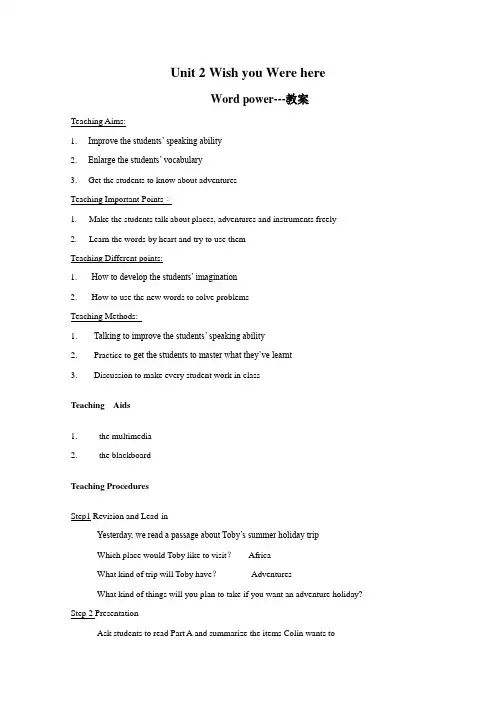
Unit 2 Wish you Were hereWord power---教案Teaching Aims:1.Improve the students’ speaking ability2.Enlarge the students’ vocabulary3.Get the students to know about adventuresTeaching Important Points:1.Make the students talk about places, adventures and instruments freely 2.Learn the words by heart and try to use themTeaching Different points:1.How to develop the students’ imagination2.How to use the new words to solve problemsTeaching Methods:1.Talking to improve the students’ speaking ability2.Practice to get the students to master what they’ve learnt3.Discussion to make every student work in classTeaching Aids1.the multimedia2.the blackboardTeaching ProceduresStep1 Revision and Lead-inYesterday, we read a passage about Toby’s summer holiday tripWhich place would Toby like to visit?AfricaWhat kind of trip will Toby have?AdventuresWhat kind of things will you plan to take if you want an adventure holiday? Step 2 PresentationAsk students to read Part A and summarize the items Colin wants totake on his holiday(show the diagram on the screen)What to take Why to take them1. tent to sleep in2. sleeping bag to keep warm3. life jacket the water may be dangerous4. pan to cook food5. parka and boots to keep warm in the mountainsStep 3 V ocabulary learningAsk students to compare their answers with the items listed in PartB , paying attention to students’ pronunciation and spellingStep4 PracticeAsk students to read the letter in Part C, choosing the proper words tomake the letter meaningfull.Jennifer suggested that Colin take a first aid kit on his trip. Whatitems should be included in a first aid kit?Bandages, Aspirinand a compass.Step5 DiscussionWhat instruments will you take to:1.climb a mountain?2.explore a forest?Step 6 Homework。
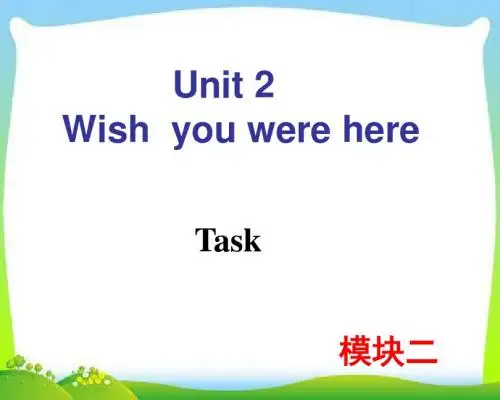
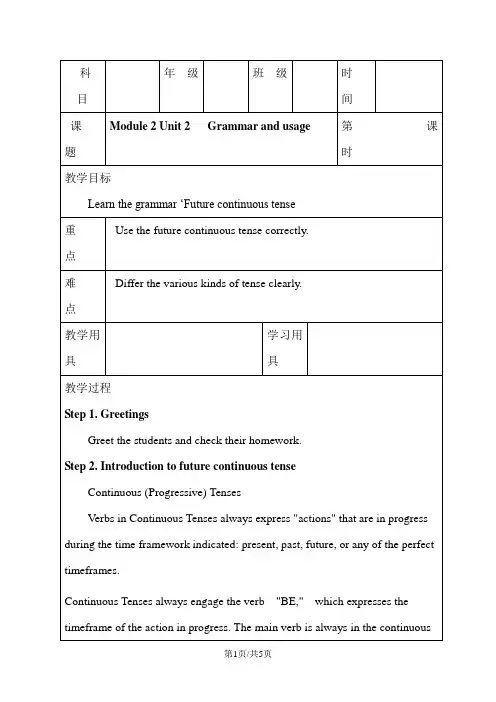
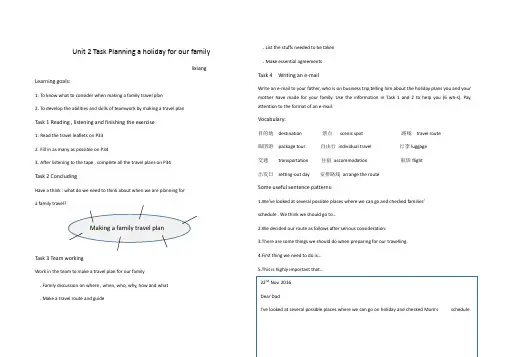
Unit 2 Task Planning a holiday for our familylixiang Learning goals:1.To know what to consider when making a family travel plan2.To develop the abilities and skills of teamwork by making a travel planTask 1 Reading , listening and finishing the exercise1.Read the travel leaflets on P332.Fill in as many as possible on P343.After listening to the tape , complete all the travel plans on P34Task 2 ConcludingHave a think : what do we need to think about when we are planning forTask 3 Team workingWork in the team to make a travel plan for our family. Family discussion on where , when, who, why, how and what. Make a travel route and guide. List the stuffs needed to be taken. Make essential agreementsTask 4 Writing an e-mailWrite an e-mail to your father, who is on business trip,telling him about the holiday plans you and your mother have made for your family. Use the information in Task 1 and 2 to help you (6 wh-s). Pay attention to the format of an e-mail.Vocabulary:目的地destination 景点scenic spot 路线travel route跟团游package tour 自由行individual travel 行李luggage交通transportation 住宿accommodation 航班flight出发日setting-out day 安排路线arrange the routeSome useful sentence patterns:1.We’ve looked at several possible places where we can go and checked families’schedule . We think we should go to...2.We decided our route as follows after serious consideration:3.There are some things we should do when preparing for our travelling.4.First thing we need to do is...5.This is highly important that...22nd Nov. 2016Dear DadI’ve looked at several possible places where we can go on holiday and checked Mum’s schedule.We think we should go to。
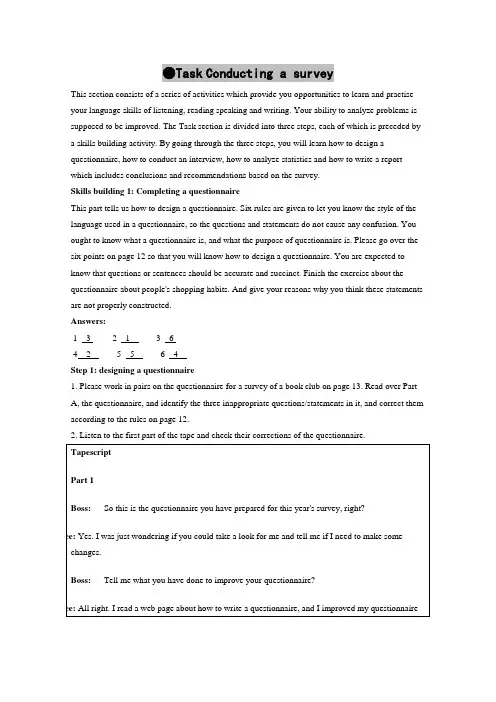
●Task Conducting a surveyThis section consists of a series of activities which provide you opportunities to learn and practise your language skills of listening, reading speaking and writing. Your ability to analyze problems is supposed to be improved. The Task section is divided into three steps, each of which is preceded by a skills building activity. By going through the three steps, you will learn how to design a questionnaire, how to conduct an interview, how to analyze statistics and how to write a report which includes conclusions and recommendations based on the survey.Skills building 1: Completing a questionnaireThis part tells us how to design a questionnaire. Six rules are given to let you know the style of the language used in a questionnaire, so the questions and statements do not cause any confusion. You ought to know what a questionnaire is, and what the purpose of questionnaire is. Please go over the six points on page 12 so that you will know how to design a questionnaire. You are expected to know that questions or sentences should be accurate and succinct. Finish the exercise about the questionnaire about people's shopping habits. And give your reasons why you think these statements are not properly constructed.Answers:1 32 13 64 25 56 4Step 1: designing a questionnaire1. Please work in pairs on the questionnaire for a survey of a book club on page 13. Read over Part A, the questionnaire, and identify the three inappropriate questions/statements in it, and correct them according to the rules on page 12.2. Listen to the first part of the tape and check their corrections of the questionnaire.3 Listen to the second part of the tape and finish designing the questionnaire in Part A.TapescriptPart 2Boss:Now, this year we're going to start a new mystery book club. So, can you add two more questions?Question Number Nine, are you interested in a mystery book club? Question Number Ten, howmuch would you spend on mystery books each month?Employee: Let me take them down. Nine, are you interested in a mystery book club, question mark.Boss: Oh, don't forget to add ‘yes’ and ‘no’ with a box beside each of them, so that club members can choose their answer.Employee: OK. And ten, how much would you spend on mystery books each month, question mark. Is that right?Boss: Right. Don't forget to provide answers under the question.Employee: OK. The answers could be less than ten yuan, ten yuan to nineteen yuan, twenty yuan to twenty-nine yuan, and no less than thirty yuan.Boss: Good.Employee: Anything else that you want me to do?Boss: Can you give me the new questionnaire tomorrow?Employee: Sure.Answers:B 9 Are you interested in a mystery book club? Yes [ ] No [ ]10 How much would you spend on mystery books each month?less than ¥10 [ ] ¥10—19 [ ]¥20-29 [ ] no less than ¥30 [ ]Skills building 2: greeting others and making introductionsLearn how to greet others in an appropriate manner first and then you will know how to introduceyourselves and say what you intend to do and why. Practise a dialogue in pairs at the end, using theskills you have learned in this part.1. How do you greet each other or your teachers on the way to school in the morning?Please go over Point 1 on page 14.2. What do you say when you first meet someone? How do you introduce yourself to others?Go over Point 2. You will conduct an interview after the introduction.3. Work in pairs, one as a member from the school magazine, the other as the student whose articleis to be included in the next issue of the school magazine. Talk about the writer's plan for the article.You may begin like this:Student 1: Good morning/afternoon. My name is.. I'm a member of our school magazine. I'd like to ask you a few questions if you don't mind.Student 2: Certainly not. What do you want to know?You may talk about the following things, such as Justin Foster's disappearance, visits to some highschools in the USA or hobbies and interests of high school students, etc.Possible exampleStudent 1:Good morning/afternoon.Student 2:Good morning/afternoon.Student 1:My name is ... I'm a member of our school magazine. I'd like to ask you a few questions if you don't mindStudent 2:Certainly not.Student 1:I know you are going to write an article for the next issue of our school magazine. Could you please tell me what you're going to talk about?Student 2:I will talk about what our students usually do after school.Student 1: Oh, it must be very interesting. Can you tell me something more about your article?Student 2:Yes. I designed a questionnaire for a survey about what the students in our school like in their spare time...Step 2: conducting an interviewIn this part, you will conduct an interview about Best Book Club in pairs, using the questionnaireyou have revised on page 13. In this way you can practise the speaking skills you have learned inSkills building 2. You can gather statistics from a number of questionnaires after conducting somesurveys.1. Read Part A on page 14 to make sure you know what to do. Then work in pairs to role-play aninterview between a club employee and a club member. At the same time, finish the questionnaire onpage 13. You can begin like this:Club employee: Hello.Club member: Hello.Club employee: My name is ... I'm a staff member in this club. I know you're a member of our club. Would you mind if I ask you some questions?Club member: Of course not.2. Work in pairs to go over Part B on page 15. This time, one of you will be the boss of the club, the other the employee of the club. The employee will tell the boss the club member's answers to the questionnaire. Use the questions in Part B to create a dialogue.Skills building 3: analyzing statisticsYou’ll learn here how to analyse statistics that are gathered from questionnaires, and how to draw conclusions and make recommendations through the statistics. Try to improve your abilities of analysing and solving problems in the activities.1. Go over the two points on page 16. Make sure you know what can be obtained through analyzing the statistics from questionnaires. Through analysis, you can draw conclusions and make recommendations. Thus, you can discover what people are interested in, what they are doing or they want to do. Try to think of more conclusions and recommendations about the example sentence. Here’s some examples for conclusions: Many students in our class know how to use anEnglish-Chinese dictionary. Many students like to use an English-Chinese dictionary to help them learn English. And some example for recommendations: It is a good idea to use an English-Chinese dictionary in studying English.2. Read the pie chart about students' hobbies and interests and analyse the statistics. Draw at least three more conclusions and make another three recommendations.Answers:Conclusions:2. The second most popular activity for students in the school is surfing the Internet.3. Only a few students in the school like reading.4. Most students in the school do not like dancing.Recommendations:2. The school should guide students in surfing the Internet.3. The school should find ways to arouse students' interests in reading.4. The school should take measures to make more students become interested in dancing.Step 3: writing a reportWrite a report about the possibility of starting a mystery book club after analysing the statistics. Read the three charts first to get the statistics. Then draw some conclusions and make recommendations. At last write a report to the boss about their findings.1. Work in groups and discuss the statistics on page 17. Draw conclusions and make recommendations from them by making a list.AnswersStatistics:1. Mystery books members are interested in: 39%2. Number of people interested in a mystery club: 81%3. Monthly amount of money members willing to spend on mystery books:Below¥10 23% ¥10--19 42% ¥20—29 30% no less than ¥30 5% Conclusions: Many people are interested in a mystery club and about 77% of them would like to spend more than10 yuan on mystery books per month.Recommendations: A mystery book club can be started.2. Write a report according to what you’ve discussed.Possible exampleThe Possibility of Starting a Mystery Book ClubConclusions drawn from the statistics:From the statistics, we can determine that about 39% of the members in our book club are interestedin mysteries. About 81% of the people who answered the questions are interested in a mystery bookclub. About 77% of them are willing to spend more than 10 yuan on mystery books every month. Ofthese people 5% would spend no less than 30 yuan and 30% would like to spend 20-29 yuan. So Ithink more people than we expected are interested in mysteries. They are willing to read books aboutmysteries.Recommendations based on the conclusions:We can start a mystery book club and many people will join it.。
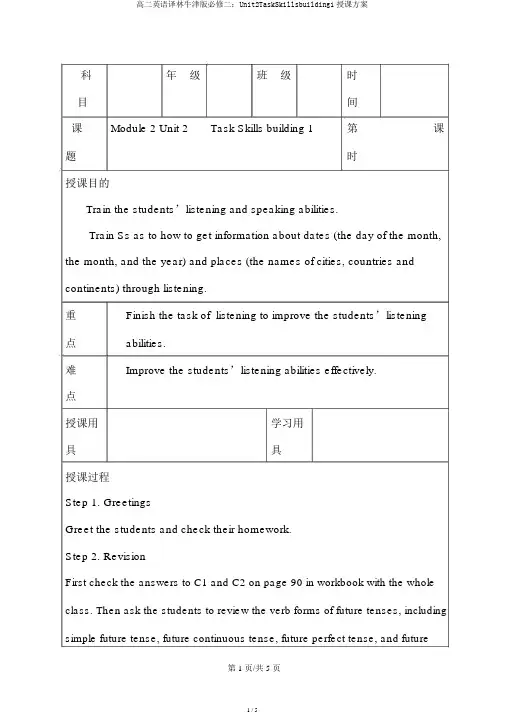
科年级班级时目间课Module 2 Unit 2Task Skills building 1第课题时授课目的Train the students’listening and speaking abilities.Train Ss as to how to get information about dates (the day of the month, the month, and the year) and places (the names of cities, countries and continents) through listening.重Finish the task of listening to improve the students’listening点abilities.难Improve the students’listening abilities effectively.点授课用学习用具具授课过程Step 1. GreetingsGreet the students and check their homework.Step 2. RevisionFirst check the answers to C1 and C2 on page 90 in workbook with the whole class. Then ask the students to review the verb forms of future tenses, including simple future tense, future continuous tense, future perfect tense, and futureperfect continuous tense. Then ask the students to do some practice:I. Multiple choice1.I _________ go shopping when the telephone rang.A. was about toB. was just toC. had toD. wanted to2.-- Are you still busy?---Yes, |I ______ my work, and it won't take long.A. just finishB. am just finishingC. have just finishedD. am just going to finish3.The crazy fans ________ patiently for two hours, and they would wait tillthe movie star arrived.A. were waitingB. had been waitingC. had waitedD. would wait4.Because the shop_______, all the T-shirts are sold at half price.A. has closed downB. closed downC. is closing downD. had closed down5.-- What's that terrible noise?-- The neighbors ________ for a party.A. have preparedB. are preparingC. prepareD. will prepare Keys: I. 1-5ABBCBStep 3. Recognize1. Let's say days of the month, the month or the year in English, such asJanuary 1st, March 2nd, May 3rd, October 9th, 2019, 2019, etc. so as to review the way to express time.When listening for dates, you need to pay attention to three pieces of information:ththe day of the month e.g. the 20the month e.g. Marchthe year e.g. 20192.Read the guidelines on page 32 to learn how to recognize dates and names of places.3.Let's listen to the tape and fill in the table. Before listening to the tape, read the names of the countries and cities given to make sure you know how these names are pronounced.For the first time, the students are asked to finish the first two lines of the form. For the second time, the students are asked to finish the third line of the form. Step4: Read travel leafletsIn this step please try to improve your ability to get useful information by reading travel leaflets and listening to the travel agent. We will first Read two travel leaflets to complete part of the two travel plans, and then finish the plans by listening to the tape.1.Read the first travel leaflet in Part A on page 33, and circle the names of all the places mentioned while reading.高二英语译林牛津版必修二:Unit2TaskSkillsbuilding1授课方案Christchurch Greymouth Queenstown (They are the cities inNew Zealand.)Some new vocabularies of the first travel leaflet:① travel leaflet 旅行宣传册② the travel agent 旅行社③ mention 提到④ bush 矮树丛⑤ axe 斧子⑥ pitsaw 大锯子⑦ seal 海豹⑧ cruise 游船⑨ Maori 毛利2.Fill in Travel Plan 1 on page 34 according to the leaflet you've just read. Ofcourse you won't be able to fill in all the details. You'll have to listen to thetape to get more information.Answers B Travel plan 1(1) South (7)Queenstown (8)traditional Maori (9)Christchurch3.Read the second travel leaflet in Part A on page 33, and circle the names ofall the places mentioned while reading. Some new vocabularies of the firsttravel leaflet:① Baotu Springs 趵突泉② Daming lake大明湖③ the Yellow River 黄河④ Mount Taishan泰山⑤ South Heaven Gate 南天门⑥ Dai Temple太庙⑦ Qufu 曲阜⑧ Confucius孔子4.Fill in the second travel plan according to what you’ve read in the sec travel leaflet.To fill in all the details .you need to listen to the tape to get more高二英语译林牛津版必修二:Unit2TaskSkillsbuilding1授课方案information .Answers B Travel plan 2(12)Ji’ nan (14)Yellow (16)sunrise (18)Dai (19)teahouse (20)birthplace5.Listen to the tape to get more information in order to finish the two plans on page 34Step 5. Summary and Homework板书设计授课后记。

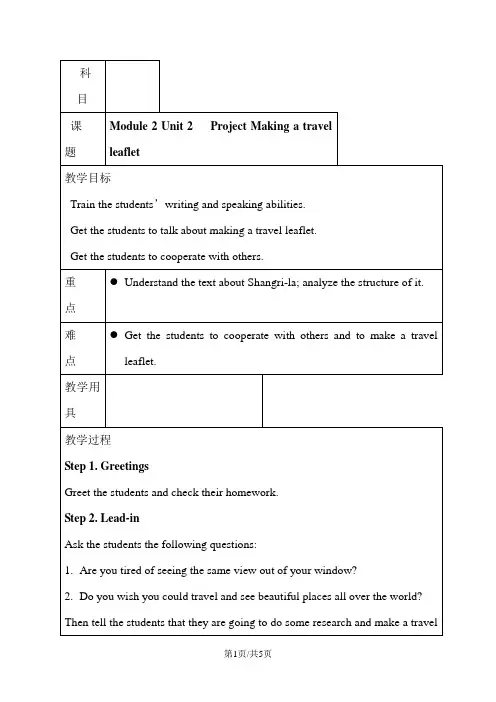
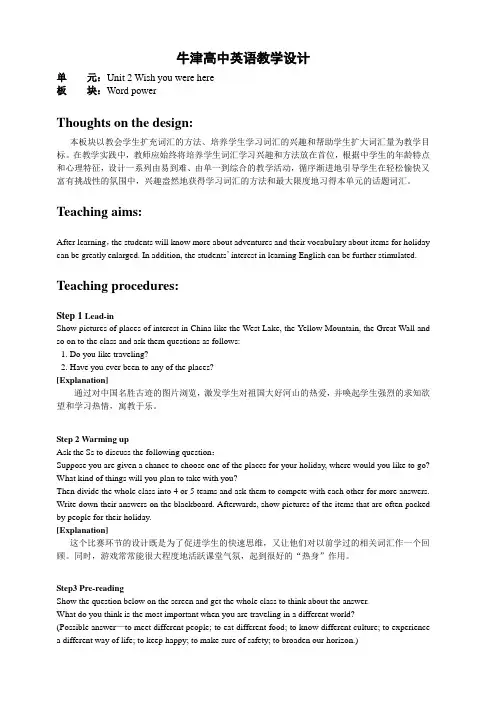
牛津高中英语教学设计单元:Unit 2 Wish you were here板块:Word powerThoughts on the design:本板块以教会学生扩充词汇的方法、培养学生学习词汇的兴趣和帮助学生扩大词汇量为教学目标。
在教学实践中,教师应始终将培养学生词汇学习兴趣和方法放在首位,根据中学生的年龄特点和心理特征,设计一系列由易到难、由单一到综合的教学活动,循序渐进地引导学生在轻松愉快又富有挑战性的氛围中,兴趣盎然地获得学习词汇的方法和最大限度地习得本单元的话题词汇。
Teaching aims:After learning,the students will know more about adventures and their vocabulary about items for holiday can be greatly enlarged. In addition, the students’ interest in learning English can be further stimulated.Teaching procedures:Step 1 Lead-inShow pictures of places of interest in China like the West Lake, the Yellow Mountain, the Great Wall and so on to the class and ask them questions as follows:1. Do you like traveling?2. Have you ever been to any of the places?[Explanation]通过对中国名胜古迹的图片浏览,激发学生对祖国大好河山的热爱,并唤起学生强烈的求知欲望和学习热情,寓教于乐。
Step 2 Warming upAsk the Ss to discuss the following question:Suppose you are given a chance to choose one of the places for your holiday, where would you like to go? What kind of things will you plan to take with you?Then divide the whole class into 4 or 5 teams and ask them to compete with each other for more answers. Write down their answers on the blackboard. Afterwards, show pictures of the items that are often packed by people for their holiday.[Explanation]这个比赛环节的设计既是为了促进学生的快速思维,又让他们对以前学过的相关词汇作一个回顾。
英语必修2译林牛津版Unit 2教案(阅读02)Module2 Unit 2 Wish you were here ReadingTeaching objectives:By the end of this period, Ss will:1.develop their' ability of reading and writing an informal letter.2.know about different parts of Africa .3.form a positive attitude towards solving problems .Keys & puzzles1.How to make students learn to write an informal letter.2.How to analyze and solve problem related to reading. Teaching approachespetition method to make students master the main idea related to the reading part.2.Exercise method to consolidate what have been learnt in class Teaching aidsMulti-media and a blackboard教师看高考31—Would you like ____ m ore cakes ?Yes, ___A.some ;no moreB.some ;another two cakesC.any ;more two cakes D any, more than two32._____________________ The pupils were struck by beauty of nature.A. XB. aC.the D an33.---Is Bill on duty today ?---It ___be him.lt is my turn.A. may notB.won't C mustn't D can't34.He translated the young tree to the park it was the best time for it.A.whereB.whenC.whatD.that35.The continent of Asia lies __ the east of the continent of America.A. in B on C to D. along36.lt was not until 1920 regular radio broadcasts began.A.whileB.which C,that D.since37.1000 guests were all found in the room which only__________ 800 people.A.seat ;seatB.hold ;holdC.hold ;seatD.seated ;hold38 We Chinese are all ___ the successful bid for the 2008 Olympic games to be held in Beijing.A. pride in B proud of C. proud in D.pride of39.He is said __ a broad, but I don't know which country he studied in.A.to have studiedB.to studyC.to be studying D,to have been studying40.—I'm sorry I didn't do a good job.---Never mind.you have tried your best.A.Above allB.ln allC.At allD.After all31,答案:B解析:考查代词,如果希望得到对方的肯定答复,在问句中用some.another two cakes :two more cakes :two more cakes.32,答案:C.解析:考查冠词。
Unit2 Reading教案Teaching Aims:Train the students’ reading ability and know how to write an informal letter.1.Get the students to know the main idea of the text.2.Develop the students’ creative, comprehensive and consolidating abilities. Teaching Important Points;1.Develop the students’ reading ability.Teaching Difficult Points1. How to make the students understand the passage better.2. How to help the students finish all the exercises.3. How to help the students develop their creative, comprehensive and consolidating abilities.Teaching Methods:1.Fast-reading method to get the general idea of the passage.2.Careful -reading method to get the detailed information in the text.3.Discussion after reading to help the students finish the tasks.4. Acting to develo p the students’ creative, comprehensive and consolidating abilities.Teaching Aids:the multimediaTeaching Procedures:Step 1 RevisionStep 2 Free-talk and Lead- inShow a map of Africa to students and ask them to discuss the following questions;1.Can you tell me where the pyramids are located?2.Apart from the grasslands, what else do you know about Africa?Prepare some pictures. Encourage students to talk about Africa after watching them. Step 3 Fast ReadingAsk students to skim the passage and answer the following questions:1.who wrote the following letter?Toby wrote this letter.2.What animal is uncomfortable to sit on?Camel3.How long will the author stay in Africa?About four weeks.Step4. Guide students to the Reading Strategy of this unit and then ask them some questions:1. Are address included? (Yes/No) (Yes)2. Are dates included? ( Yes/No) (Yes)3. Are friendly greetings usually used at the beginning of the letter?( Yes/No) (Yes)4. Is the reader’s surname addressed? ( Yes/No) (No)Step 5 Reading1.Reading the letter again carefully and then choose the best answer.2.Then complete the following form:PStep 6Try to put the activities in the correct order:___3_______ travel down the River Nile___2______travel on camels through the Sahara Desert___5_______climb Mount Kilimanjaro in Tanzania___4_______see wild animals in Kenya___1_______fly to Morocco___6______ go to the HimalayasStep 7 VocabularyChoose the correct meanings for the words below. Write the letters in the blanks on page 24.Step8 Discussion1.Which part of the world would you like to visit? Why?2.Adventures such as mountain climbing and whit-water rafting can be dangerous.Do you think it is worth risking your life for adventures? Why or why not?Step 9 Homework:1. Finish the exercises in part D ,E on page 24,252. Unit Revision: P77: Period 1.。
牛津高中英语教学设计单元:Unit 2 Wish you were here板块:TaskThoughts on the design:本节课是以听、说、读为主的技能训练课。
技能训练课应当从学生的实际水平出发,灵活运用教材所提供的资源,遵循学生的认知规律,逐步、分层进行教学。
同时也要兼顾师生间的情感互动、学生的情感融入与兴趣的激发。
在获得学生认可的同时,不仅要使学生有话可说,而且有话想说,从而实现以学生参与为主、教师协助为辅的技能训练目标。
Teaching aims:After having this period, students will be able to get information about dates and places through listening. Meanwhile they are supposed to improve their speaking skills by using what, where, when, who, why and how to form questions and dialogues.Teaching procedures:Step 1 Lead-inA: Ask students the following questions to have them focus on dates. One example is given for the students to know better what to do.What are great days to you?On what day do they fall?(The table is from PPT)B: A quiz is also designed to make students more familiar with the countries and cities that will appear in the listening material, especially the pronunciation of some words. (Refer to PPT) [Explanation]这个环节从“great days”入手,充分调动学生的参与热情,大量地谈论日期以及当时的活动,实现了对于日期的复习,也较好地进行了“说”的热身,并自然地导入本课主题——travel。
牛津译林版高一英语上册M2 U n i t2W i s h Y o u W e r e H e r eWelcome to the unit---教案Teaching Aims:1.Learn about traveling2. Develop students’ speaking ability by talking about places in the world and traveling.Teaching Important Point:Develop students’ speaking ability.Teaching Difficult Point:How to get students to speak more and improve their speaking ability.Teaching Methods:1. Free talk to arouse students’ interest in traveling.2. Discussion to make students finish the task of speaking.Teaching Aids:1. The multimedia2. The blackboardTeaching Procedures;Step 1 Greeting and Lead-in(Show the students some pictures on the screen)1. Do you like traveling?Do you want to visit these picturesque places?Why do you want to visit these places?Step 2 Welcome to the unit(Show the students 4 pictures of Africa, Australia, Brazil, and Gobi Desert)Which of these places would you like to visit most?And why?Step 3 Some questions about yourself1. Have you ever been to some places?2. What is the most exciting place you have ever been to?3. Try to describe the place for us.Step 4 Pair WorkBob just come back from Sydney, and now Susan is asking him about his trip.1.Work in pairs and try to use the following expressions.Useful expressions:• What do you think of the city?• How do you find the city?• Are there any places of historic interest to see in this city?• What is the city famous for?• Would you please tell me something about the historic art of the city?• I’d like to look around the city.• Ho w I wish I could go there someday!2. Act out your dialogue in front of the class.Step 5 Discussion-- talk about traveling(show the following on the screen)Bob likes traveling, but Jean thinks it too costly and she has a good idea about how to travel without paying too much.Step 6Homework1.Find more information about places in the world and traveling.2.Preview the reading text.Good staying with you!Thank you for your cooperation!Unit 2 Wish you Were hereWord power---教案Teaching Aims:1.Im prove the students’ speaking ability2.Enlarge the students’ vocabulary3.Get the students to know about adventuresTeaching Important Points:1.Make the students talk about places, adventures and instruments freely 2.Learn the words by heart and try to use themTeaching Different points:1.How to develop the students’ imagination2.How to use the new words to solve problemsTeaching Methods:1.Talking to improve the students’ speaking ability2.Practice to get the students to master what they’ve learnt3.Discussion to make every student work in classTeaching Aids1.the multimedia2.the blackboardTeaching ProceduresStep1 Revision and Lead-inYesterday, we read a passage about Toby’s summer holiday tripWhich place would Toby like to visit?AfricaWhat kind of trip will Toby have?AdventuresWhat kind of things will you plan to take if you want an adventure holiday? Step 2 PresentationAsk students to read Part A and summarize the items Colin wants totake on his holiday(show the diagram on the screen)What to take Why to take them1. tent to sleep in2. sleeping bag to keep warm3. life jacket the water may be dangerous4. pan to cook food5. parka and boots to keep warm in the mountainsStep 3 Vocabulary learningAsk students to compare their answers with the items listed in PartB , paying attention to students’ pronunciation and spellingStep4 PracticeAsk students to read the letter in Part C, choosing the proper words tomake the letter meaningfull.Jennifer suggested that Colin take a first aid kit on his trip. Whatitems should be included in a first aid kit?Bandages, Aspirinand a compass.Step5 DiscussionWhat instruments will you take to:1.climb a mountain?2.explore a forest?Step 6 Homework。
Unit 2 Wish you Were here Task: Planning a holiday for your family ---教案Teaching aims:Train the students’ listening and speaking abilities.Get the students to talk about planning a holiday.Get the students to write an .Teaching important points:Finis h the task of listening to improve the students’ listening ability.Finish the task of choosing a holiday destination to train the Ss’ speaking ability.Finish the task of writing an .Teaching procedures:Step 1 lead in 3 mins1. What will you do on th e ing New Year’s Day? Would you like to travel?2. If you have a chance to visit some place with your family, which place would you like totravel most?Step 2A Here are two wonderful places for you to choose. Open your book turn to page33. Read thesetwo leaflets and circle the names of the places mentioned and underline some new words that you don’t know.Adventure on South Island, New Zealand1.Christchurch go White-water rafting2.Greymouth3.Queenstown take a River cruise, have a Maori dinnerExplore Shandong Province1.Ji’nan Baotu SpringDaming LakeThe Yellow River2.Tai’an Mount TaishanSouth Heaven Gate,sunrise,Dai Temple,teahouse3.Qufu ConfuciusB.Up to now, you have got a general idea of these two pl aces.It’s time for you to draft travel plans for your family to consider.Read the holiday leaflets carefully and fill in as many details as possible.Before starting, let’s look at the first plan together.Destination: the place you will visitDuration: time during which your visit lastsTour departs:how often the tour leavesTour leaves on: when the tour leavesTravel Plan 1(1)South (7)Queenstown (8)traditional Maori (9)ChristchurchTravel Plan 212) .Ji’nan (14). Yellow (16). Sunrise (18). Dai(19). Teahouse (20). birthplaceC.Listen carefully as the travel agent gives you more information .plete the travel plans above . Travel Plan 1(2)¥17,00 (3)five (4)four (5)train (6)Boat (10)weekly (11)FridayTravel Plan 2(13)first (15)six (17)bus (21) ¥1,200Step3 Skills building 2 : forming questions from promptsNow we have got so much infromation about these two places. Are you eager to visit these countries? Maybe you have already chosen a place to travel. But what about your family? So you have to discuss with your father or mother to take his or her advice.Suppose your mother is away on business. You are phoning her to find out about your holiday plan and choose a holiday destination.A:First,please ask your partner some questions according to part A .1 .Type of holiday What type of holiday do you prefer ?2 . Cost How much will you spend ?3 . Places to visit Where do you want to go ?/what do you want to see?4. Time When do you want to travel ?5. Duration How long do you want to travel ?B:Then make up a dialogue and work in pairs as son/daughter and mother .3 mins are given.Son/Daughter :Mum, what type of holiday do you prefer ?where do you want to go ?Mum: Actually I don’t know . I just want to take an active holiday .……Now all of your have the final holiday destination. please write an to your father,who is on a business trip, telling him about the holiday destination you and your mother have chosen for your family.Step4 Skills building 3: writing anA:Lead-in:By the way,do you know how to write an ?Points to note:1. type in the address of the person you are writing to and the subject of your2. don’t have to type in your address3. greet the person ( Dear …)4. start the ( Hell o …)5. type your first name at the end6. use contractions( I’m fine )There are many ways of ending an informal :All the best Best regards Lots of love LoveLove from Regards Take care YoursB: ing your father 8 mins are givenWrite an–mail to your father, tell your father about your holiday destination.• Where?• When?• What activities?•What ..see…?• The duration?• The cost?Possible examplesSample 1Dear Dad,I’ve looked at several possible places where we can go on holiday and checked Mum’s schedule. We think we should go to Shandong Province because none of us have ever been there before . If we go, we’ll have an active holiday climbing Mount Taishan.Even though there will not be an y river cruises, Mum can explore famous lakes and springs in Ji’nan.We can also visit Qufu, the birthplace of Confucius.I think she’d like this.We can travel in Mary, between the 1st and 7th. The trip lasts 4 days and 3 nights. It costs only 1,200 yuan per person, so Mum will be pleased with that.I think this trip sounds very exciting and it sounds just like what you and Mum want. Let me know if I should book it.Bye for now.Love(student’s own name)Sample 2Dear Dad,I’ve looked at several possible places where we can go on holiday and checked Mum’s schedule.We think we should go to South Island in New Zealand because none of us has ever been there before. If we go there, we can have an active holiday. We can trek through the bush and walk along the beach. And we can go on a river cruise. This is what Mum wants to do. Also we can have a traditional Maori dinner there.We can travel in May, between the 1st and the 7th.The trip lasts 5 days and 4 nights. It costs 7,000 yuan per person. But Mum only wants to spend 3,000 yuan for each. Anyhow, I think this trip sounds very exciting and is just like what you and Mum want! Let me know if I should book it.Love(student’s own name)Step 5 think about 1 minWhat do you learn from this lesson?Step6 Homework:make a one day tour plan to your hometown.。
牛津高中英语教学设计
单 元:Unit 2 Wish you were here
板 块:Task
Thoughts on the design:
本节课是以听、说、读为主的技能训练课。
技能训练课应当从学生的实际水平出发,灵活运用教材所提供的资源,遵循学生的认知规律,逐步、分层进行教学。
同时也要兼顾师生间的情感互动、学生的情感融入与兴趣的激发。
在获得学生认可的同时,不仅要使学生有话可说,而且有话想说,从而实现以学生参与为主、教师协助为辅的技能训练目标。
Teaching aims:
After having this period, students will be able to get information about dates and places through listening. Meanwhile they are supposed to improve their speaking skills by using what, where, when, who, why and how to form questions and dialogues.
Teaching procedures:
Step 1 Lead-in
A: Ask students the following questions to have them focus on dates. One example is given for the
students to know better what to do.
What are great days to you?
On what day do they fall?
(The table is from PPT )
B: A quiz is
also designed to make students more familiar with the countries and cities that will appear in the listening material, especially the pronunciation of some words. (Refer to PPT)
[Explanation]
这个环节从“great days ”入手,充分调动学生的参与热情,大量地谈论日期以及当时的活动,实现了对于日期的复习,也较好地进行了“说”的热身,并自然地导入本课主题——travel 。
并通过“quiz ”的方式让学生预先熟悉下面的听力训练中出现的一些地名和它们的发音,为下一步的听力降低难度、做好准备。
Step 2 Listening for dates and names of places
Let students listen to the tape and fill in the table. (Refer to PPT) Great Day(s) Date / Time Period What to do
Tomb Sweeping Day April 5th / 5th April To honour the dead …
… … …
通过播放听力,使学生不仅能对上一步骤中所接触的单词和日期在听觉上得到巩固与强化,而且还能用正确的形式笔头呈现,完成听力任务。
Step 3 Reading and listening for more details
A: Allow students two minutes to read the two leaflets and mark wherever there appears a place.
B: Brainstorming
Get students to think what else is necessary besides the names of the places if one plans to travel. Collect answers from the students.
(suggested answers: departure time, cost, activities, duration, means of traveling, etc. )
students
read the
two
leaflets
once
again and
fill in the
blanks in Part B on P34. Tell them they won’t be able to finish the task once in all.
D: Ask students to summarize what information is left unsolved. Have them listen to the tape and fill in all the details.
[Explanation]
在简单的“找地名”环节后,通过问题设计从学生中获得更多与旅游(travel)有关的内容,如旅游花费、旅游方式、持续时间等,并就其中的内容要求学生对宣传单进行再阅读,完成部分信息填充题。
剩余不多的缺失信息能使学生在听的环节更有目标与重点,这也能减低听力的难度。
环环相扣的教学设计不仅让学生能明确地完成好老师布置的各项任务,而且也自然地引出下面一个训练——学生口语表达的教学环节。
Step 4 Speaking
A: According to what students have summarized in the step before, ask students to put them in another way, using questions like “Where …?”, “What …?”, “Why …?”, “When …?” etc.
B: Ask students to form questions according to Part B in Step 2.
C: Make dialogues in pairs as the son/daughter and mother using the questions you have formed.
D: Check the mother’s schedule and make a decision of where to go.
[Explanation]
说是语言学习的直观展示之一,通过在语境中的对话训练,学生能正确运用特殊疑问句,具体地进行语言的直接体验。
在这个教学步骤中,学生被要求用特殊疑问句咨询旅游信息,并进行基本句型操练。
在此基础上,适当增加难度,根据Step 2 Part B中的已知信息,利用之前的操练句型,采用两人一组的训练方式,排除个别学生不参与或少参与的可能性,使学生最大程度地获得锻炼。
Step 5 Homework
Ask students to write out the dialogue and better it by correcting as many mistakes after school.
Meanwhile they are supposed to act it out in the next period.
通过回家作业再次巩固课堂所学内容。
除了在笔头上获得强化外,对话内容第二天要表演的要求也督促学生继续“说”的训练。
同时也为“task”第二课时的教学做了较好的准备。